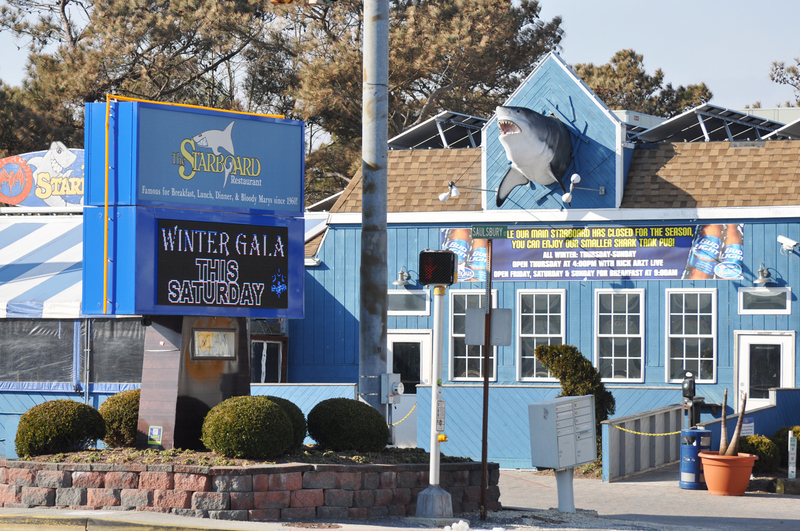The Dewey Business Partnership has offered to pay the town of Dewey Beach $50,000 annually over the next five years to avoid a tax while still contributing to the town's revenue streams.
The group's offer is in response to a proposed gross receipts tax for businesses that make more than $200,000 annually. In July, council voted 3-2 against putting a gross receipts tax to referendum. Rather than continue the debate, council gave the business community six months to come up with an alternative solution for revenue that was equitable and dependable.
“They've all come together, talked about equal participation and providing additional funds to the town and reached a consensus, which is difficult to do,” said attorney Chase Brockstedt, representing The Starboard and owner Steve Montgomery.
|
|
Under the proposal, 12 businesses will split the bill and pay the town $250,000 over the next five years. If council accepts the organization's offer, the Lighthouse and the Starboard will pay $9,000 annually, while Highway One's six businesses will pay $4,166 each and Hammerheads, Nalu, Que Pasa and Woody's will each contribute $1,000.
When asked if other businesses were reluctant to participate, Montgomery said the proposal was still a work in progress.
“Hopefully we can improve on that, and more people want to be a part,” he said. “There wasn't anyone saying they didn't want in.”
Brockstedt said the largest businesses were considered first.
“There are some very small businesses in town that are extremely seasonal that simply can't afford to throw out additional money,” Brockstedt said. “There was careful consideration with regard to not only who was going to participate but also the dollar figure.”
The budget and finance committee estimated 19 businesses would be eligible for the gross receipts tax and that would result in about $160,000 in additional revenue annually. Businesses have threatened legal action if the tax is implemented.
Bruce Vavala, the town's first mayor, said he thought the businesses were crazy to offer money because it wasn't an equitable solution. He said residents who own and occupy property in town are contributing little to nothing to the town's coffers, while businesses and residents who own rental properties are stuck with the bill.
“I'd say there are 800 people in town who get police protection, lifeguards and other things and literally pay nothing,” he said.
Dewey Beach remains one of the few towns with no property tax.
Another possible route, Montgomery said, would be to solicit a $50 donation from each household in Dewey Beach to be earmarked for capital improvements. Many of the businesses in the partnership would be willing to contribute up to $250 to the cause, he said. The impact on the town's budget, he said, would be immediate and substantial.
Vavala said he would be in favor of that proposal.
“There needs to be a challenge in this town that the people who are paying absolutely nothing need to pay something,” he said. “They need to step up. It's not a big amount of money.”
A $50 donation would equate to $40,000, he said, which doesn't measure up to what just 12 businesses are offering.
“I'm a property owner and I'll be the first one to pledge $50 for this thing,” he said.
Resident Bronie Zolper said the only fair and equitable way to ensure everyone in town is contributing is to implement a property tax.
“I know this town would never do that or not in the near future, but if you want to talk about fair and equitable that's what it is,” she said.
Council did not vote on the proposal. It was tabled so the public can become better educated about the issues at hand.
Town manager Marc Applebaum said this issue shouldn't be looked at as fair share, but rather a piece of a larger puzzle.
“There is talk around town of the words fair share, which I think incorporates a lot more than this proposal,” he said. “This is not meant to be a fair share proposal. This is meant to be a contribution from the businesses.”
Nick Roth is the news editor. He has been with the Cape Gazette since 2012, previously covering town beats in Milton and Lewes. In addition to serving on the editorial board and handling page layout, Nick is responsible for the weekly Delaware History in Photographs feature and enjoys writing stories about the Cape Region’s history. Prior to the Cape Gazette, Nick worked for the Delmarva Media Group, including the Delaware Wave, Delaware Coast Press and Salisbury Daily Times. He also contributed to The News Journal. Originally from Boyertown, Pa., Nick attended Shippensburg University in central Pennsylvania, graduating in 2007 with a bachelor’s degree in journalism. He’s won several MDDC awards during his career for both writing and photography. In his free time, he enjoys golfing, going to the beach with his family and cheering for Philadelphia sports teams.





















































